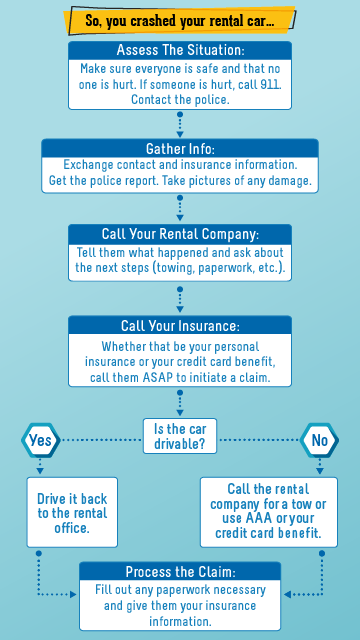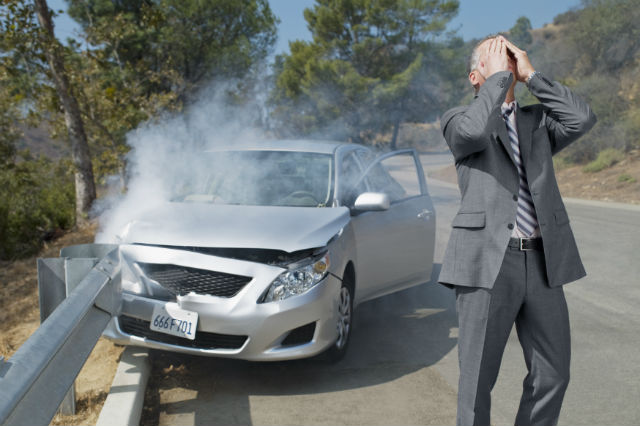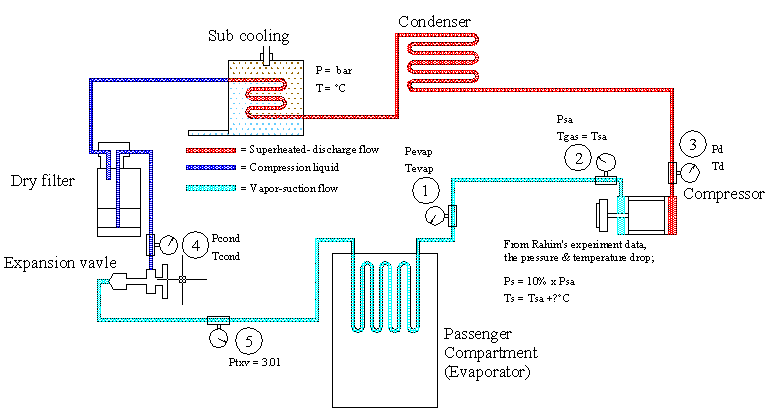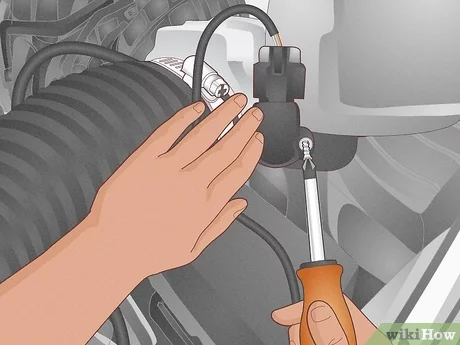Crashing a rental car can lead to financial liability and potential legal consequences. The extent depends on your insurance coverage and the rental agreement.
Renting a car offers convenience, but accidents can complicate things quickly. Understanding the potential repercussions is essential for every driver. Rental car companies have specific policies regarding accidents, and your personal insurance or credit card coverage may also play a role.
Knowing what to expect can save you from unexpected expenses and legal hassles. This blog will explore the immediate steps to take after an accident, the role of insurance, and how rental agreements impact your responsibilities. Being well-informed can help you handle the situation more effectively and minimize stress.

Credit: blog.autoslash.com
Introduction To Rental Car Accidents
Driving a rental car can be convenient. But what happens if you crash it? This guide will help you understand the process.
Common Causes Of Rental Car Crashes
There are many reasons for rental car accidents. Here are some common causes:
- Distracted Driving: Using a phone or GPS while driving.
- Speeding: Driving over the speed limit.
- Unfamiliar Roads: Not knowing the area.
- Weather Conditions: Rain, snow, or fog can cause accidents.
- Fatigue: Driving while tired can be dangerous.
Initial Steps Following A Collision
If you crash a rental car, follow these steps:
- Stay Calm: Take a deep breath and stay calm.
- Check for Injuries: Ensure everyone is safe.
- Move to Safety: If possible, move the car to a safe spot.
- Call the Police: Report the accident to the police.
- Document the Scene: Take pictures and note details.
- Contact the Rental Company: Inform them about the accident.
Handling a rental car accident can be stressful. Knowing what to do can make it easier.

Credit: magazine.northeast.aaa.com
Assessing The Situation
Crashing a rental car can be stressful. Knowing what to do next is crucial. Assessing the situation immediately helps you stay safe and manage the aftermath efficiently.
Safety First: Evaluating Injuries
Your health and the health of others come first. Check yourself and passengers for injuries. Call emergency services if someone is hurt. Get to a safe location if it’s possible.
Documenting The Scene: Photos And Notes
After ensuring safety, document the accident scene. Use your phone to take photos of the damage. Capture images from various angles. Include close-ups of the car’s condition.
Write down important details. Note the time, location, and weather conditions. Collect contact information from witnesses. This documentation can help during insurance claims.
| Action | Details |
|---|---|
| Check for Injuries | Ensure everyone is safe |
| Call Emergency Services | Dial 911 if needed |
| Move to a Safe Location | If it’s possible |
| Take Photos | Document the damage |
| Write Notes | Details about the accident |
| Get Witness Info | Names and contact details |
Having a clear record of the incident helps with reports. It ensures you have all the necessary information ready.
Contacting The Authorities
If you crash a rental car, contacting the authorities is crucial. This step ensures everyone’s safety and helps document the incident. Below, we break down the process into manageable steps.
When To Call The Police
Always call the police after a crash. This is especially true if anyone is injured. Even minor accidents require a police report. The police will assess the situation and help manage the scene.
Here are some specific situations when calling the police is necessary:
- Injuries: If anyone is hurt, call 911 immediately.
- Property Damage: If there is significant damage, notify the police.
- Disputes: If there is a disagreement about the accident, police can mediate.
- Traffic Obstruction: If the crash is blocking traffic, police will help clear it.
Obtaining A Police Report
A police report is vital for insurance claims. It contains official details of the accident. To obtain a police report:
- Ask the Officer: Request the report number at the scene.
- Visit the Station: Go to the police station to get a copy.
- Online Access: Many departments offer online reports. Check their website.
Ensure all information in the report is accurate. This can include:
| Details | Importance |
|---|---|
| Names and Contact Information | Essential for identification |
| Accident Description | Needed for insurance claims |
| Witness Statements | Helps clarify the incident |
Having a complete police report simplifies the insurance process. This helps in getting repairs done quickly.
Notifying The Rental Company
Crashing a rental car can be stressful. Notifying the rental company promptly is crucial. This step ensures proper handling and can ease the process. Here’s what you need to know about informing the rental company.
Rental Car Company Policies
Each rental car company has its own policies. These policies dictate how to handle accidents. Some companies require immediate notification. Others may have a specific timeframe. Always check your rental agreement for details.
Important points to consider:
- Read the rental agreement thoroughly.
- Understand the company’s accident reporting procedure.
- Know the contact details for reporting accidents.
Failure to follow these policies can result in penalties. It may also affect your insurance claim. Be sure to adhere to the company’s guidelines.
The Importance Of Prompt Communication
Prompt communication with the rental company is vital. It helps in quick resolution of the issue. Delays can complicate matters and increase costs. Informing them immediately can streamline the process.
Here are the steps to follow:
- Contact the rental company as soon as possible.
- Provide accurate details of the accident.
- Follow their instructions carefully.
Being prompt shows responsibility. It can also expedite any necessary repairs or replacements. Quick reporting can also help in insurance claims. Always keep a copy of the accident report for your records.
Insurance Implications
Crashing a rental car involves more than just dealing with repairs. The insurance implications can be complex. Knowing your coverage options will help you navigate this situation.
Your Personal Auto Insurance Coverage
Your personal auto insurance might cover rental car damages. Check your policy before renting. Some policies include rental car coverage. This could save you money on extra insurance.
Here are some key points to consider:
- Liability Coverage: This covers damages to other vehicles or property.
- Collision Coverage: This covers damages to the rental car.
- Comprehensive Coverage: This covers non-collision events like theft.
Credit Card Insurance Benefits
Many credit cards offer rental car insurance benefits. Check with your credit card company. These benefits can provide secondary coverage.
Here is a quick overview:
| Credit Card Provider | Coverage Type | Conditions |
|---|---|---|
| Visa | Collision Damage Waiver | Use the card to pay for the rental |
| MasterCard | Secondary Insurance | Decline rental company’s collision coverage |
| American Express | Primary Coverage | Enroll in their premium program |
Using a credit card for renting can be beneficial. Always read the fine print to understand the coverage.
Dealing With Third-party Insurance
Crashing a rental car can be stressful. Especially if other parties are involved. Knowing how to handle third-party insurance is crucial. This helps you manage claims and understand your responsibilities. This section will guide you through the process.
After a rental car accident, third-party insurance can help. If another vehicle is involved, their insurance may cover damages. Your rental car insurance may also help. It depends on the policy details.
Always get the other driver’s information. This includes their insurance details. You should also provide your rental agreement details. This helps in filing claims smoothly.
Navigating Claims With Other Involved Parties
Filing claims with other parties can be tricky. Here’s a step-by-step guide:
- Exchange contact and insurance details with all involved parties.
- Contact your rental company immediately. Inform them about the accident.
- File a police report. This official document helps in settling claims.
- Submit all required documents to your insurance company.
- Keep track of all communication and documents.
Understanding Liability And Fault
Understanding liability is key in accidents. Liability determines who pays for damages. Usually, the driver at fault is liable. But, rental agreements and insurance policies may affect this.
If you are at fault, your insurance may cover damages. If the other driver is at fault, their insurance should cover it. Always read your rental agreement and insurance policy. This helps you understand your coverage.
In some cases, both drivers may share fault. This is called comparative negligence. Insurance companies will decide the percentage of fault. Based on this, they will pay for damages.
Here’s a quick summary table:
| Scenario | Who Pays? |
|---|---|
| You are at fault | Your insurance or rental company’s insurance |
| Other driver is at fault | Other driver’s insurance |
| Both drivers share fault | Both insurances, based on percentage of fault |
Potential Financial Repercussions
Crashing a rental car can be a stressful event. Beyond dealing with the accident, you must handle potential financial repercussions. Understanding these costs can help you prepare better.
Damage Fees And Charges
When you crash a rental car, damage fees are inevitable. These fees cover the repair costs for the vehicle. The rental company assesses the damage and charges accordingly. They may also charge for minor damages like scratches or dents.
Here’s a breakdown of potential damage fees:
- Minor Damages: Scratches, dents, and minor bumper damages.
- Major Damages: Engine issues, total loss, and structural damages.
You may also face additional charges if the car needs specialized parts. These parts can increase the cost significantly.
Loss Of Use And Administrative Fees
Rental companies may charge for the time the car is out of service. This is known as a Loss of Use Fee. This fee compensates the company for lost rental income.
The calculation for Loss of Use fees varies. It generally depends on the daily rental rate and the number of days the car is unavailable. For example, if the daily rate is $50 and the car is unavailable for 10 days, the fee would be $500.
| Daily Rate | Unavailable Days | Total Loss of Use Fee |
|---|---|---|
| $50 | 10 | $500 |
| $75 | 5 | $375 |
Administrative fees are another cost to consider. These fees cover the paperwork and processing related to the accident. They may seem small but can add up quickly. Always review your rental agreement for specific details on these fees.
The Role Of Rental Car Insurance
Renting a car offers great convenience. But accidents can happen. Understanding rental car insurance is crucial. It can save you from hefty out-of-pocket expenses. Knowing your options helps you choose wisely.
Collision Damage Waiver Explained
The Collision Damage Waiver (CDW) is a common term. It’s not actual insurance. Instead, it waives your responsibility for damage. This applies to the rental car in case of an accident.
Without CDW, you might pay for repairs. This includes dents, scratches, or major damage. CDW can reduce this burden.
Some rental companies offer CDW at an additional cost. Check if your personal car insurance covers rentals. Also, some credit cards provide CDW benefits. Always review the terms carefully.
Supplemental Insurance Options
Rental companies offer other insurance options too. These can provide extra protection. Here are some common choices:
- Personal Accident Insurance (PAI): Covers medical costs for you and passengers.
- Personal Effects Coverage (PEC): Protects personal belongings in the car.
- Supplemental Liability Protection (SLP): Offers additional liability coverage.
Each option has its benefits. Assess your needs before choosing. Sometimes, your existing insurance might cover these areas. Verify with your insurance provider.
Understanding these options helps you make informed decisions. It ensures you’re well-protected during your rental period.
Legal Considerations And Responsibilities
Crashing a rental car brings many legal considerations and responsibilities. Understanding these can save you from future problems. This section covers the most important legal aspects.
Contractual Obligations With The Rental Agency
When you rent a car, you sign a contract. This contract outlines your responsibilities. Here are some key points:
- Report the accident immediately: Notify the rental agency as soon as possible.
- Follow the rental agreement: Read the terms and conditions carefully. They define what you should do after a crash.
- Insurance coverage: Check if the rental includes collision damage waiver (CDW) or loss damage waiver (LDW).
- Payment for damages: You may be responsible for repair costs. This depends on your insurance coverage.
State Laws And Rental Car Accidents
State laws vary regarding rental car accidents. Knowing these laws helps you navigate the legal landscape. Key considerations include:
- Police report: Some states require a police report for any accident. Check local laws to be sure.
- Liability laws: States have different rules on who is liable. This affects who pays for damages and injuries.
- Insurance requirements: Minimum insurance requirements vary by state. Make sure you have the necessary coverage.
- Time limits: Some states have strict deadlines for reporting accidents. Missing these can lead to penalties.
Understanding these legal considerations ensures you handle a rental car accident properly. This knowledge can protect you from additional costs and legal issues.

Credit: whitneyfirm.com
Preventing Future Rental Car Accidents
Preventing future rental car accidents is crucial for a safe journey. By following simple safety tips and choosing the right rental insurance, you can avoid mishaps. Here’s how:
Safe Driving Tips
- Always wear your seatbelt: It can save your life in an accident.
- Follow speed limits: This reduces the risk of accidents.
- Avoid distractions: Keep your focus on the road.
- Stay sober: Never drive under the influence of alcohol or drugs.
- Check weather conditions: Drive carefully during rain or snow.
Choosing The Right Rental Insurance
Selecting the best rental insurance is vital. It can protect you from hefty costs.
| Type of Insurance | Coverage |
|---|---|
| Collision Damage Waiver (CDW) | Covers damage to the rental car. |
| Liability Insurance | Covers damage to other vehicles and property. |
| Personal Accident Insurance | Covers medical expenses for injuries. |
| Theft Protection | Covers loss if the rental car is stolen. |
Read the terms: Understand what each insurance covers.
Ask questions: Clarify doubts with the rental company.
Compare options: Choose the insurance that fits your needs.
Conclusion: Lessons Learned
Crashing a rental car can be a stressful experience. But it also offers valuable lessons. Understanding these lessons can help future renters avoid pitfalls. Below, we summarize key takeaways and tips for being a prepared and informed renter.
Key Takeaways
- Always inspect the rental car: Check for damages before driving away.
- Understand your rental agreement: Know what is covered and what is not.
- Get the right insurance: Ensure you have adequate coverage for accidents.
- Report accidents immediately: Inform the rental company and insurance provider.
- Document everything: Take photos and notes at the scene of the accident.
Being A Prepared And Informed Renter
Preparation and knowledge are key to a smooth rental experience. Always read the rental agreement thoroughly. Know what to do in case of an accident. Here are some tips to help you be a prepared and informed renter:
- Inspect the Car: Look for existing damages and report them.
- Understand Insurance Options: Know what your personal insurance covers.
- Know Emergency Procedures: Familiarize yourself with the rental company’s accident protocol.
- Carry Important Contacts: Have the rental company’s contact details handy.
- Keep Documentation: Always have your rental agreement and insurance papers with you.
By following these steps, you can minimize stress and confusion. Being prepared helps you handle accidents efficiently. This ensures a safer and smoother rental experience.
Frequently Asked Questions
What Happens If You Damage A Car From Enterprise?
You are responsible for the repair costs if you damage a car from Enterprise. Your insurance or purchased coverage may help.
How Does Damage To A Rental Car Work?
Damage to a rental car is charged to the renter. Costs depend on the rental agreement and insurance coverage. Always inspect the car before and after rental. Report any damages immediately.
Who Pays For A Rental Car After An Accident In Texas?
The at-fault driver’s insurance typically pays for the rental car after an accident in Texas. If the at-fault driver is uninsured, your own insurance may cover it, depending on your policy.
What Happens If Something Happens To A Rental Car?
Report the incident to the rental company immediately. Follow their instructions and fill out any required forms. Your insurance or the rental company’s coverage may handle repairs.
What Should I Do After A Rental Car Crash?
First, ensure everyone’s safety. Then, contact the rental company and your insurance provider immediately.
Who Pays For Rental Car Damage?
The renter is usually responsible. Insurance may cover damages depending on your policy and rental agreement.
Does My Personal Insurance Cover Rental Cars?
Often, personal insurance includes rental car coverage. Check with your provider for specifics and limitations.
Can I Use Credit Card Insurance?
Yes, many credit cards offer rental car insurance. Review your card’s terms to understand what is covered.
Conclusion
Crashing a rental car can be stressful, but knowing the steps to take helps. Always contact the rental company immediately. Check your insurance coverage beforehand for peace of mind. Understanding your responsibilities can prevent unexpected costs. Stay informed and drive safely to avoid accidents altogether.



